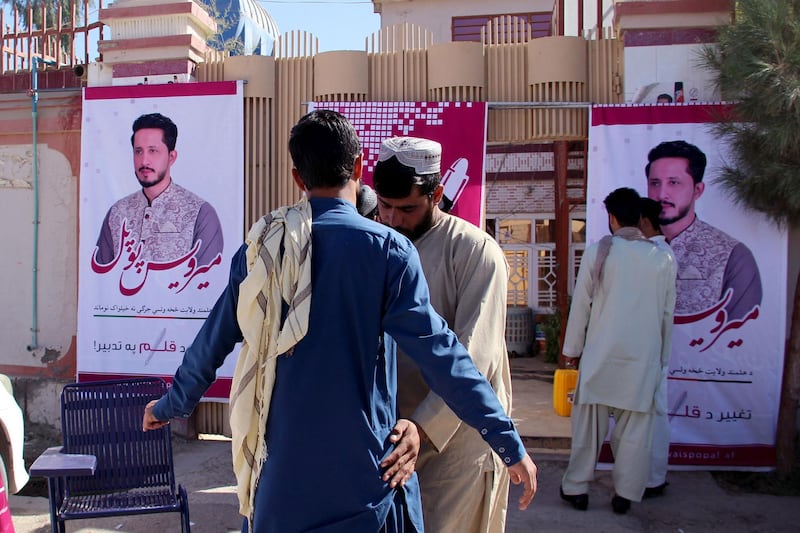Taliban fighters have killed at least 26 Afghan policemen in heavy fighting in both northern and central provinces overnight, days before parliamentary elections that the militant group have pledged to disrupt with violence.
The latest clashes took place against the backdrop of increasingly positive signs of progress between the US and the Taliban after direct talks last week. Zalmay Khalilzad, the new US special envoy for peace in Afghanistan, met with officials from the group in Doha, where the Taliban embassy is stationed.
In the northern province of Samangan, Taliban fighters attacked security checkpoints late Monday, killing 13 members of the local police force, including deputy police chief Khawanai Taheri.
Samangan police spokesperson Munir Rahimi confirmed to The National that Taliban forces overran police checkpoints in the Dari Soof area of the province.
“The local police had planned an operation in that area to clear the Taliban presence to conduct safe elections,” he said.
“But the Afghan forces were overpowered by the Taliban fighters resulting in at least 13 casualties,” he said, adding that the Afghan soldiers also inflicted at least 30 casualties among the Taliban fighters. The area remains contested.
In the central province of Daikundi, hundreds of Taliban fighters equipped with heavy weapons attacked checkpoints in Kajran district and fought an hours-long battle in which eight Afghan soldiers and five police were killed, Ali Akbar Nateqi, the provincial governor's spokesman said.
The Taliban's main spokesman, Zabihullah Mujahid, claimed responsibility for both attacks.
Taliban attacks have been taking place with increased frequency across Afghanistan in the last month ahead of the much-delayed parliamentary elections scheduled for October 20. The Taliban continue to shun the electoral process in Afghanistan, despite the ongoing peace negotiations with the United States administration.
In a statement released last week the Taliban referred to the upcoming elections as “bogus” and “not in our broader national interest”.
“It is the demand of our faith and intuition that this process should be considered unreliable, reprobated and prevented from taking place,” the statement read.
The statement further instructed its fighters to “to halt this American-led process throughout the country by creating severe obstacles”.
The Afghan government has deployed nearly 50,000 Afghan forces to secure the elections, the Ministry of Interior spokesperson confirmed.
“We have enough troops to deal with any security threat, and more than 50,000 security personnel including police, army and intelligence have been deployed and put on high alert,” he told the local media.
Despite this, reports from several provinces indicated that as many as 2,000 polling stations remain inaccessible due to security.
While most of these attacks are targeted towards the security forces, the Taliban has not shied away from targeting local candidates and their supporters. An explosion at an election rally of parliamentary candidate Nazifa Beg, last Saturday, in Takhar province claimed 44 casualties.
_________
Read more:
Youth wave challenges Afghan elections
Afghan voters to get a giant ballot paper in Kabul
[ Taliban threatens to disrupt elections with attacks ]
Suicide bomber strikes election rally in southern Afghanistan
_________
At least 12 civilians were killed after a bomb on a motorcycle detonated amidst the rally crowd. Two parliamentary candidates – Mohammad Nasir Mubaraz from Kandahar and Salem Mohammad Achakzai from Helmand – were also killed during their campaigns over the last three weeks.
The overall civilian casualties for the year also reflected the deteriorating security situation in the country. The latest report by the United Nations said there have been 8,050 civilian casualties – 2,798 dead and 5,252 injured—since January. Of these 366 civilian casualties – 126 deaths and 240 injured – were from election-related violence. The UN body has expressed concern over the vulnerability of civilians and civilian infrastructure during the election days.
A report by Ali Yawar Adili of the Afghan Analysts Network noted that the Taliban along with the growing Islamic State in Afghanistan has directly threatened election workers and security services.
“Nationwide, disenchantment with elections themselves, after the disastrous 2014 poll, has been coupled with a resurgent [Taliban], who by controlling more districts than four years ago have been able to prevent millions of Afghans from even registering to vote,” he observed.
“Some Afghans have felt it is a risk too far to participate,” he said.
However, despite mounting threats from the Taliban, over 2,500 candidates have nominated themselves for elections, and over 8 million Afghans have registered to vote across the country.
Idrees Stanikzai, a candidate from Kabul, is among the many candidates who chose to continue fighting even as threats to their safety have increased. "I would rather be killed fighting for this country and my values, rather than live and die like a sheep," he told The National.
The same sentiment was echoed among Afghan voters who have persistently demanded these election be held for the last three years.
“We have sacrificed so much and so many lives over the last few decades for democracy, and now we have the opportunity to participate in the democratic process,” pointed out Professor Zekrullah Faiq, who teaches at Kabul University.
“Of course, I will go to vote, and show the world and the insurgents that we are not afraid,” he added.





